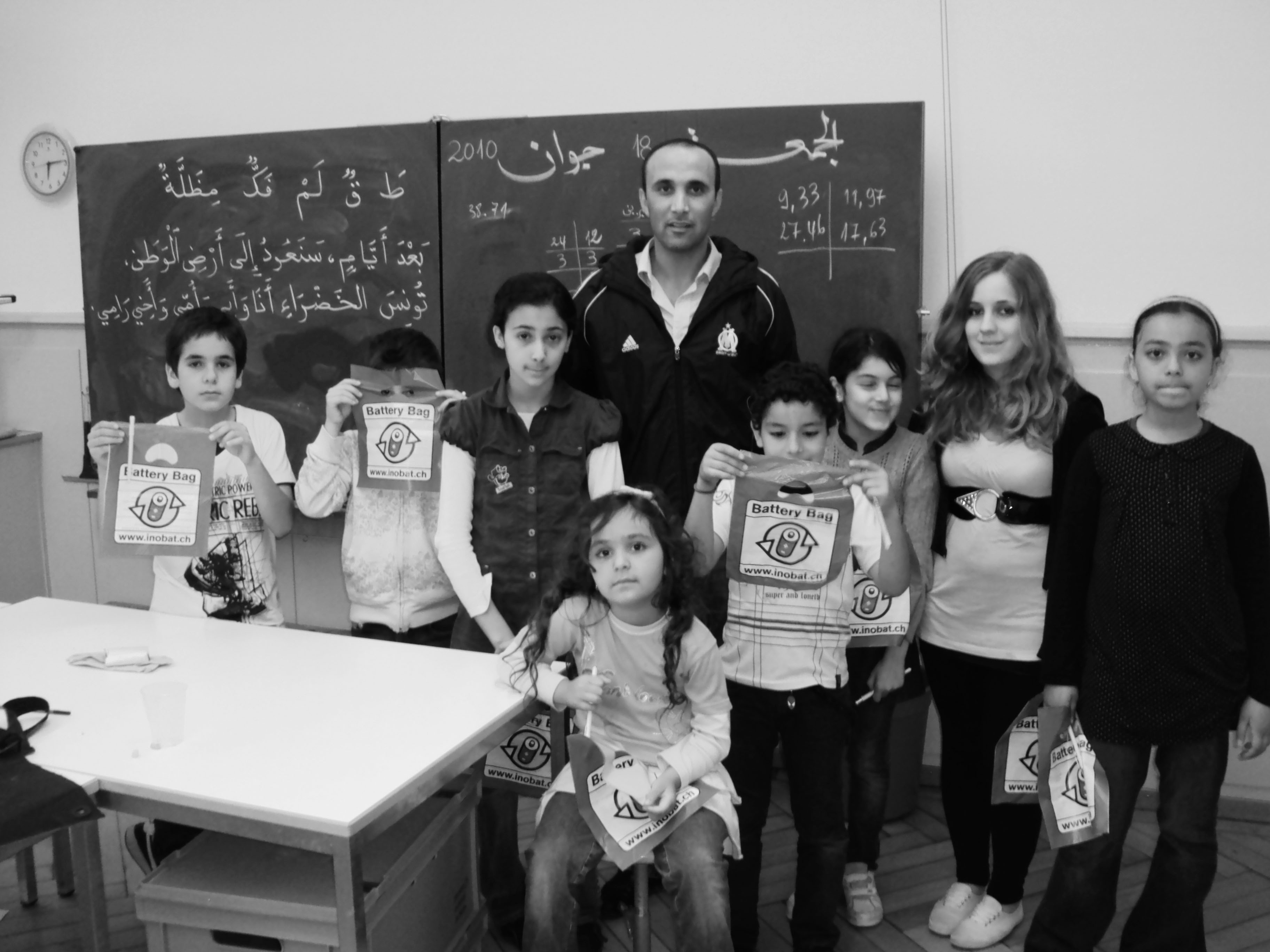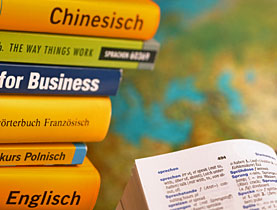Calls to improve Arabic teaching in Switzerland

The demand for Arabic courses in Switzerland is growing – both among the resident Arab community and Swiss interested in the language.
Now there are also growing calls for improvements in the way the language is taught.
Schools for teaching Arabic started to appear in Western countries as far back as the 16th century. The phenomenon spread after Arab and Muslim communities started to settle in the West from the second half of the 19th century.
The fact thousands of Westerners have embraced Islam has also played a role in the expansion of Arabic teaching.
Despite the negative impressions that dominated Western public opinion after the September 11, 2001 terror attacks, the Arabic language has continued its spread in the West.
After a time of uncertainty, the Arab community are beginning to feel they are an important part of Western society, with the right to hold on to their culture and pass it down to future generations.
This has coincided with a growing interest among non-Arabs in learning the language for cultural, economic and social reasons. The numbers of Western students registering in university Arabic language departments have been steadily increasing in recent years.
Almost every city or municipality in Switzerland has a cultural society, a national club or a cultural centre that organises Arabic lessons and introduces the culture and history of the language.
Munji Ahmadi teaches at the Tunisian school supervised by the Tunisian embassy in Bern. “We have boys and girls, and the ages are mostly between 6 and 13 years,” he said.
Different motives
There are multiple motives for learning Arabic. But it is clear that the shift of the Arab presence in Western countries from a fleeting, marginal one into a permanent phenomenon and a vital reality, and the sense of being excluded – perhaps on racist grounds – have led new generations of Arabs to reconsider the concept of social integration.
For them, this is no longer achieved by cutting ties with the Arab roots of their parents, but through the cementing of links with this civilisation and the strengthening of identity.
Sufian Bin Hamidah, a teacher of Arabic at many Swiss language teaching institutions, goes further. He puts the interest in learning Arabic down to “the uniqueness of the Arabic language at the level of writing and calligraphy, as Westerners are attracted to the aesthetic and artistic dimension of its style of writing”.
“Also, some Westerners would like to have a small window through which they can approach the culture of the Orient and learn the major aspects of Islam,” he said.
Added to that is the dimension of social communication, as there are “Western women married to Arabs, and Arab women married to Westerners”.
“In both cases, there is a dire need for the Arabic language, either for communication purposes or even as a courtesy and a desirable thing.”
The insistence on introducing children to Arabic reflects a growing feeling among parents that learning the language links their children to their religion and culture. This is an important point because most Arab families living in the West today have daily contact with the language through watching Arabic satellite TV channels and listening to Arabic radio stations.
Explaining this growing awareness, Ahmadi said: “Arabic for them remains the mother tongue. Children must learn it to communicate with their relatives when they go back home. It is also the language of the Koran, and the best way to learn the teachings of Islam.”
Economic factor
This is not to say that learning the language in Western countries is restricted to Muslims. There is a trade exchange, particularly with Arab Gulf states. And Arab cities, such as Dubai and Doha, have become a Mecca for businessmen and celebrities. Some think learning Arabic will make it easier for them to directly communicate with individuals or institutions.
Not forgetting the millions of tourists who are annually attracted by the scenery and climate in the Arab world. Contact with the Arab environment may generate a desire in them to learn and master the language to get closer to the reality of these societies.
For non-native speakers to learn the language, there are many requirements that need to be met, not least, sufficient time for what can be a lengthy process.
Bin Hamidah notes that lessons in Switzerland may be too infrequent. “One class a week is not enough, particularly in light of the absence of a communication environment for this language outside the class.”
Room for improvement
Arabic is being taught today in Switzerland in various settings. There are schools inside clubs and Arabic cultural centres. Lessons are also offered at Swiss schools for teaching foreign languages and some people of Arab origin provide private tuition.
But as interest in the language has grown, the desire to cash in has sometimes been put above the insistence on quality of teaching.
Bin Hamidah says improved standards and coordination are needed. “There is a potential for correcting this situation by ensuring that only specialists engage in teaching Arabic, and by providing suitable spaces for learning. There should also be some kind of coordination between those working in the field, whether individuals or institutions.”
There is no central institution for teaching the Arabic language in Switzerland. Such an institution would undoubtedly help adapt courses and improve communication between all partners in this field.
“I also think that it is necessary to set up this institution because if there is a coherent pedagogical framework and clear, well-planned courses, the learning process would be easier, performance would improve and the interest in the language would increase,” said Ahmadi.
The Tunisian embassy offers Tunisian nationals living in Switzerland a service for teaching civilisation and Arabic at 11 Swiss cantons. The service is also open to other Arab nationals depending on the availability of places.
The current recipients of this service are around 250 children and young men who are offered free lessons on a weekly basis.
The provision of these lessons is supervised by three teachers on attachment from the Tunisian Ministry of Education.
These tuition sessions are offered outside the official school hours at Swiss schools.
Language sessions are offered in the following towns:
Geneva: Two classes, on Wednesday
Lausanne: One class, Saturday morning
Bern: One class, Friday after 4pm
Biel: One class, Wednesday afternoon
Neuchâtel: Two classes, Saturday afternoon
Basel: One class, Thursday after 4pm
Zurich: One class, Wednesday after 4pm
St Gallen: One class, Wednesday afternoon
Schaffhausen: Two classes, Wednesday after 4pm
Winterthur: One class, Friday after 4pm
Sion: One class, Saturday afternoon
National languages
German 63.7%
French 20.4%
Italian 6.5 %
Romansh 0.5%
Other languages
Serbian-Croatian 1.4%
Albanian 1.3%
Portuguese 1.2%
Spanish 1.1%
English 1.0%
Turkish 0.6%
Tamil 0.3%
Arabic 0.2 %
(Sources: Last federal language census conducted in 2000)
(Adapted from Arabic by Muhammad Shokry)

In compliance with the JTI standards
More: SWI swissinfo.ch certified by the Journalism Trust Initiative












You can find an overview of ongoing debates with our journalists here . Please join us!
If you want to start a conversation about a topic raised in this article or want to report factual errors, email us at english@swissinfo.ch.